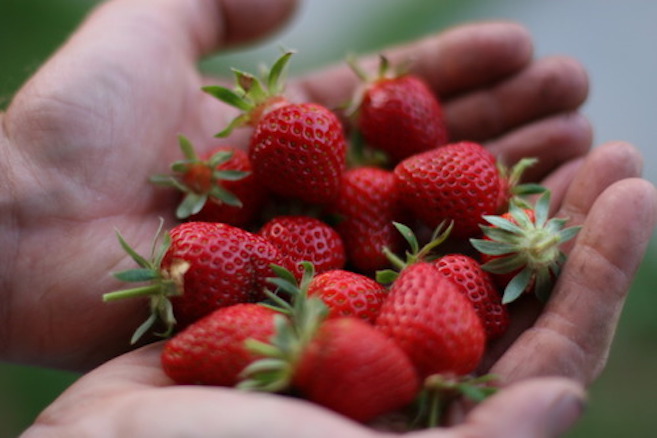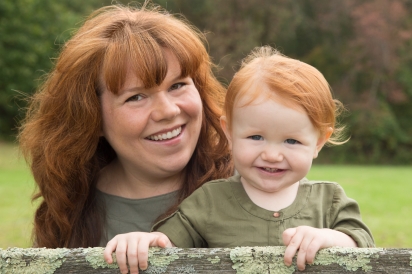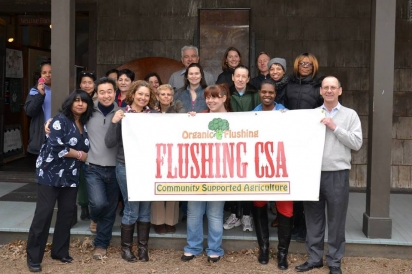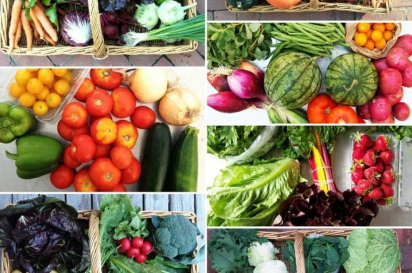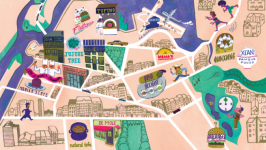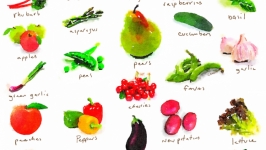Bringing Good Food and Community to Queens
It’s 6:30 on a Thursday evening in late winter. The dark doesn’t stop 3-year-old twins Caroline and Josephine from playing happily between boxes and trestle tables under the lamp-lit canopy. Their mother, Emily Sheahan, keeps an eye on them as she meets with the Flushing CSA Core Team to discuss the winter veggie lineup.
Brought together by a shared love of food, Flushing Community-Supported Agriculture (CSA) is the very essence of an urban community: a diverse group of locals cooperating to provide their families with clean, healthy food and creating a close-knit network in the process. In the case of Flushing CSA, members buy a “share,” that is, they pay up front in the spring for weekly boxes of produce from June 1 until the week before Thanksgiving. The CSA also offers a share during the winter months.
For farmer Maggie Wood of Golden Earthworm Organic Farm, which supplies all the vegetables for the Flushing CSA along with 10 of the 15 CSAs in Queens, the upfront payment is crucial. “For the summer boxes, all our expenses occur in the spring. That’s when we buy the seeds, the fertilizers and equipment we need for the coming season.” The CSA system allows Wood to plan her year’s crops, and she is freed from concerns about price fluctuations.
The other benefit is less tangible: “As a human being I love the connection between myself and the members. I love to know that thousands of plates of food being eaten on a given day are the same as the plate I’m eating.”
“My goal is to never go to a supermarket again,” Sheahan said. Flushing CSA boxes are filled on site at Golden Earthworm Farm the day before delivery and driven to the CSA pickup point in the farm’s own trucks. “There’s a very direct relationship between the farmer and the consumer,” Wood said. The contents depend on which eight to 10 vegetables are ready for harvest on that day. A typical box might include, potatoes, leeks, collard greens, parsley, carrots and a salad green or radicchio. “My kids have played with Maggie’s kids,” Sheahan adds.
What began as a conversation between neighbors in 2009 has expanded to 50 members. Flushing CSA takes its role as a community builder seriously. Every member must commit to volunteering to distribute the shares twice during the season. Founding and current core group member Judy Karlin’s cheerful smile makes everyone feel welcome, even those in need. The CSA offers subsidized shares for those without the means to pay in full.
When members and interested locals met in the Quaker Meeting House on Northern Boulevard in March, Ryan Kroeger, CSA manager at Golden Earthworm Organic Farm, walked them through the process of planting, tending and harvesting the CSA produce to assure the gathering that produce is delivered in Queens within 24 hours of being harvested.
Sheahan, Karlin and the other core members have spent hours organizing the event, as well as many more hours planning and running the CSA. “This is my community, it’s where I live, and I want it to work,” said Sheahan, an at-home mother of three. Stepping up and taking charge also helps Sheahan maintain her professional skills while raising her kids.
Larry Leung, another core group member, loves that “the decisions on what to cook are based on what is available seasonably. You can eat tomatoes all year, but with the CSA you realize that tomatoes are at their absolute best in July and August in New York.”
John Choe, another founding and core group member. agrees. “Being in the CSA has forced me to eat better. Wasting all these vegetables isn’t an option.” While organic produce is expensive in stores, when priced out, only one store came close to matching the CSA’s prices—but with regular produce, not organic.
“Besides, you don’t have to go to the supermarket and decide what to buy,” Sheahan adds. “Mother Nature has made that decision for you.”
This connection to nature is treasured. “In the supermarket, something like global warming can seem a long way away,” Leung said. “But with a CSA you’re close to the reality of farming and its dependence on the weather. I was in a Manhattan CSA during Hurricane Irene. Our upstate farmer was flooded out, and we had no produce for two months.”
Due to demand, the CSA added dairy and meat shares and, more recently, bread. Sheahan and Wood both emphasized the connection between one farm and the consumer. The dairy comes from Goodale Farm, and while members can order a variety of products such as bread and spices from Lewis Waite Farm through the CSA, neither is a wholesaler.
“There are fake CSAs that are really just wholesalers buying from several farms,” Wood said, pointing out that this is counter to the philosophy of sharing the risk and the bounty. “They can drop a farm if they find the produce cheaper somewhere else,” she added.
It’s easy to understand why members are so committed. At pickups they greet each other like old friends. Few fail to stop, talk to the twins and catch up with each other before heading home to eat.
Check out a full guide to CSAs in Queens here.
Flushing CSA | @flushingcsa
Golden Earthworm Farm | @goldenearthworm
Goodale Farm | @goodale_farms
Lewis Waite Farm


